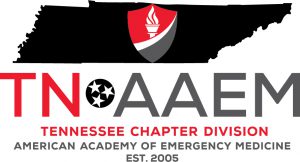
The Tennessee Chapter Division of AAEM (TNAAEM) advocates for the values of AAEM at the state level for its TNAAEM members.
More about TNAAEM
Learn more about TNAAEM through its bylaws.
BylawsPresident
William E. Lummus, MD FAAEM
Vice President
Brian T. Hawkins, MD FAAEM
Secretary/Treasurer
Arthur Smolensky, MD FAAEM
Immediate Past President
James Parnell, MD FAAEM
At-Large Directors
Jacqueline Dovgalyuk, MD FAAEM
Open* (four positions)
Resident Representative
Ashley Dailey, DO
Miranda Teixeira, MD
Student Representative
Olivia Sosnoski, MS
Board Liaison
Heidi Best, MD FAAEM
Staff Liaison
Elizabeth Mueller
*Interested in filling an open position? Please contact AAEM for more information.
If you are already a member of AAEM or AAEM/RSA:
- AAEM Members: Add a TNAAEM Membership
- AAEM/RSA Members. Add a TNAAEM Membership
If you are not a current AAEM or AAEM/RSA Member:
- Email us or call (800) 884-2236 to join TNAAEM today.
- You can also add a TNAAEM Membership online when you become an AAEM member or AAEM/RSA member!
Dues
- Full Voting ($50)
- Associate ($25)
- Fellow-in-Training ($25)
- Resident (Free)
- Medical Student (Free)
Chapter division memberships run on a calendar year and must be renewed annually.
There are no upcoming events at this time.
Press Release and Statement from the Tennessee Chapter Division of the American Academy of Emergency Medicine on Surprise Medical Bills
The U.S. House Committee on Energy and Commerce and Senate Committee on Health, Education, Labor and Pensions recently outlined a follow-up proposal to address surprise medical bills.
But this proposal fails to substantially differ from the rate-setting long sought by the health insurance industry and thus fails to preserve funding for America’s medical safety net – it’s emergency departments and the professionals who work there.
The Tennessee Chapter Division of the American Academy of Emergency Medicine (TNAAEM) strongly opposes this measure.
Any legislation that hurts patients, closes hospitals, and leads to doctor shortages is not a solution. Congress must get this policy right and stop surprise medical bills with legislation that puts patients first and protects their access to quality medical care.
As stated in the Academy’s Position Statement on Balance Billing and Out-of-Network Charges:
America’s emergency departments carry a huge charity burden as they deliver care to the uninsured and Medicaid patients, and Medicare doesn’t begin to fund that charity mission. If insurers are freed by restrictions on out-of-network fees and balance billing to choose for themselves what they will pay for emergency medical care, emergency physician groups will go out of business, emergency departments and even some hospitals will close, and the medical safety net will unravel.
The Academy and TNAAEM support protecting patients from surprise out-of-network bills for emergency care, but that can easily be done without giving insurers the power to arbitrarily pay whatever they want for emergency medical care, as bills such as S.1895 by Senators Alexander and Murray would do. Sadly, the recently announced proposal would not allow an independent dispute resolution process for emergency physician bills less than $750, capping payments for those at the 50th percentile of the insurer’s in-network rate. Since the vast majority of bills for professional fees from emergency physicians, perhaps even more than 90%, are less than $750, this bill would legalize arbitrary rate-setting by insurers and eliminate any need for insurers to negotiate in good faith to get emergency physician groups into their networks.
Tennessee’s emergency departments depend on the minority of patients with commercial insurance to cover the unfunded costs of uninsured, Medicaid (TennCare), and Medicare patients. If private insurers are allowed to escape this cross-subsidy and drop funding for the medical safety net, as rate-setting would allow them to do, either state and federal government would have to step up and provide that funding or the safety net would cease to exist.
No patient should ever have to pay more out-of-pocket for emergency care than the in-network rate, but charges to insurance companies should not be capped any lower than the 80th percentile of the “usual and customary” fee as defined by a database that is not owned and controlled by the insurance industry, such as FAIR Health.
